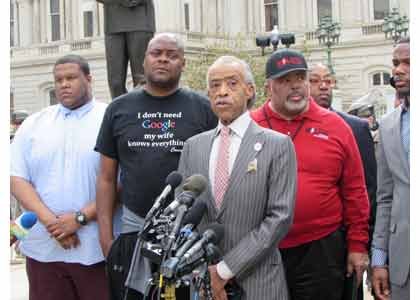BALTIMORE — The numbers are staggering, as of Monday, April 27, 2015— the day family members held a funeral for Freddie Gray— statistics revealed that there were 68 homicides in Baltimore, including three individuals under the age of 18. Fifty-nine of those murders were of African-Americans, reportedly committed by other blacks.
Three-year-old McKenzie Elliott, an African-American, was shot to death standing on her porch in Waverly in August 2014, and despite many eyewitnesses, no one has come forward.
“There has been no hash tag that says ‘Black lives matter,’ no public outrage, no protests or demonstrations about her death,” said Earl Al-Amin, the Imam of the Muslim Community Cultural Center in Baltimore, himself a longtime leader in the city’s African-American community.
“It’s apparent that we don’t want to confront reality. If all black lives matter then why do we hold candlelight vigils when we kill one another but when someone outside of the race kills us, then we protest with fervor and intensity that’s unmatched,” Al-Amin said.
Al-Amin, who has served the community working with young individuals for nearly 40 years, said those leading protests over Gray’s death have reached out to him to participate, but he’s not interested. “We are evading the issues and we’ve allowed elements to come in so that we can’t fulfill our potential.”
“We constantly look outside of ourselves instead of inside. Marcus Garvey once said that ‘no one will do as much for you as you will do for yourselves.’. I have stayed out of this because I’m very wary of what has taken place,” he said. “We have mishandled this ‘No justice, no peace’ thing and we won’t look at ourselves and except internal responsibility.”
Gray died days after being arrested by Baltimore police on April 12, 2015. Mayor Stephanie Rawlings-Blake has called for transparency, wanting to know exactly what happened. However, as protestors continue to cry out that, “Black Lives Matter,” Al-Amin and others said there’s too much black on black crime.
“All black lives matter,” said Attorney Reginald Greene, whose group “Black Lawyers for Justice” has been instrumental in helping to organize some of the local demonstrations. “Black on black killing by civilians is a major issue and it is a serious problem that must be addressed.
Marvin Wright, who said he simply came to Baltimore from New Jersey to pray for Gray’s family and not to participate in demonstrations, was stunned by the violence. “Not just the burning of buildings,” Wright said. “But, look at how nasty these people who are supposed to be seeking justice are to each other. They respect no one and they claim they want the police to respect them.”
Sylvia Jordan, a Washington, D.C. nurse who came to Baltimore to check on the welfare of her sister who lives in the area, said she is disgusted by the devastation of the community. She said she doesn’t understand why African-Americans only seem to get upset when others outside of the race commit crimes against them.
“We should be equally upset, not rioting, but equally annoyed when we kill each other,” Jordan said. “I can never participate in any of these protests unless and until black lives matter to black people.”
While police must be held accountable for their actions, Al-Amin says protest leaders should also be held responsible for the escalating riots and damage to the city. He singled out Reverend Jamal Bryant of the Empowerment Temple, an organizer for demonstrations who gave the eulogy at Gray’s funeral.
“Bryant has some issues. He’s knowledgeable but not wise because wisdom is knowledg e with discretion and Bryant has stoked the flames for this,” Al-Amin said.
Bryant declined comment, choosing only to answer questions from CNN reporters.
“He won’t answer questions about black on black crime and why there is no outrage over that,” Al-Amin said.
Officials from the NAACP, Al Sharpton’s National Action Network and Jesse Jackson’s Rainbow Push Coalition also declined to respond to those same questions.
“The people are being manipulated by provocateurs,” Al-Amin said. “You see young African-American males acting out not because of a sense of outrage or a sense of justice. You see them acting out because they are getting their 15 seconds of fame. These misguided young men are playing to an agenda and their basic needs were not [being] met in their formative years. ”
“It’s disconcerting for me to watch the so-called faith leaders and political leaders in this because they are not saying anything and they refuse to focus on black on black crime.”
